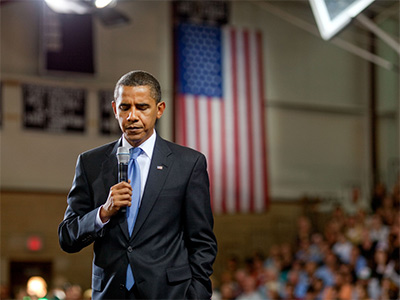Obama's War on Economics
The CBO pans his minimum-wage proposal; the administration swings back.
 In its analysis of President Obama’s proposed minimum wage increase, the Congressional Budget Office made a startling revelation: the nonpartisan number-crunchers confirmed the basics of Econ 101.
In its analysis of President Obama’s proposed minimum wage increase, the Congressional Budget Office made a startling revelation: the nonpartisan number-crunchers confirmed the basics of Econ 101.
Raising the price of something, in this case unskilled labor, will decrease demand for it. So raising the federal minimum wage to $10.10 an hour is likely to cost 500,000 jobs, the CBO concluded.
And it’s possible, they say, that job losses due to the minimum wage hike could reach as high as one million, at a time when many are struggling to find work and even dropping out of the labor force entirely out of frustration.
Econ 101 did not go over well at 1600 Pennsylvania Avenue. “Our review is that zero is a perfectly reasonable estimate of the impact of the minimum wage on employment,” Jason Furman, chair of the White House Council of Economic Advisers, told reporters.
Furman was part of the Obama administration’s pushback against the CBO analysis, which is normally infallible when projecting things like Obamacare-induced deficit reduction, but he didn’t lay it on too thick. “Sometimes you have to have respectful disagreement between economists,” he said, adding, “I don’t think this is the CEA vs. CBO.”
It was once the overwhelming consensus of economists across the spectrum that minimum wage increases cost jobs, for very basic microeconomic reasons. But in the 1990s, liberal economists Alan Krueger and David Card published a study that upset the apple cart by purporting to find minimum-wage hikes that increased rather than decreased employment.
Card and Krueger looked at 410 fast-food restaurants in Pennsylvania and New Jersey, concluding that the Garden State’s minimum wage increase boosted employment at these venues. The result was controversial, and two separate studies trying to replicate the Card-Krueger results came to the opposite conclusion.
There have even been reports that Krueger and Card substantially walked back their 1994 conclusion, saying, “The increase in New Jersey’s minimum wage probably had no effect on total employment in New Jersey’s fast-food industry, and possibly had a small positive effect.” But it was enough for liberals to pull loose threads in the consensus that higher minimum wages mean fewer jobs.
Popular talking points suggest the costs of minimum wage increases are offset by increased productivity, reduced absenteeism, and less turnover when workers are paid higher wages. And liberals still touted the positives from the CBO report: the increase will raise incomes for more people than it will destroy jobs, while pushing 900,000 of 45 million poor Americans above the poverty line.
But even minimum-wage hikers on some level know an increase will, all other things being equal, reduce employment. Otherwise, why stop at $10.10 an hour? Why not $12, $15 or even $5,000?
Some liberals acknowledge as much. “If the White House genuinely believes that a hike to $10.10 would have zero negative impact on job creation, then the White House is probably proposing too low a number,” Matthew Yglesias wrote in Slate, later concluding, “A minimum wage hike with a small but real disemployment impact is the minimum wage hike you want.”
Businesses can often absorb a small minimum wage increase, especially when the federal minimum is lower than many state minimums and the prevailing market rate, in an unregulated labor market with plenty of exemptions.
Minimum wage hikes are never cost-free, however, and this is not a great time to price the unskilled out of the labor market. It’s a policy that tends to hit minorities and the young particularly hard.
If anything, the CBO may be being too generous to Obama’s plan. Past studies have found a smaller minimum wage hike didn’t affect state poverty rates. “When we allow for negative employment effects, we find that the working poor face a disproportionate share of the job losses,” Joseph Sabia and Richard Burkhauser wrote in the Southern Economic Journal. “Our results suggest that raising the minimum wage continues to be an inadequate way to help the working poor.”
What would be better? The earned income tax credit, though flawed, increases workers’ take-home pay and more clearly benefits the working poor. A straightforward payroll tax cut would boost pay for millions while also incentivizing job creation.
Both of those policies, however, cost the federal government money instead of businesses. So instead of allowing people to keep more of what they earn, Washington will keep it and try to spin away the negative jobs impact of a higher minimum wage.
W. James Antle III is editor of the Daily Caller News Foundation and author of the new book Devouring Freedom: Can Big Government Ever Be Stopped?
